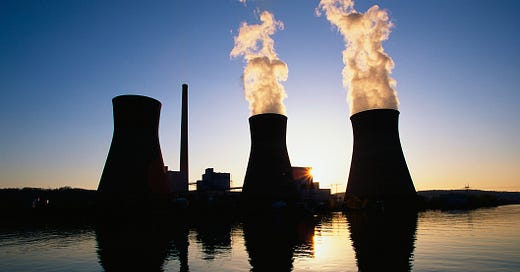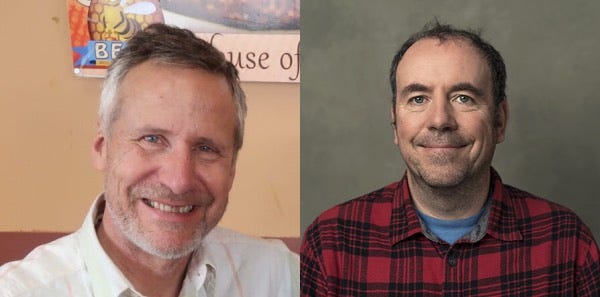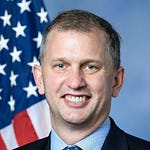Coal now has such a bad global reputation that it’s hard to find any business or government entity openly supporting it — so in the parts of the world where coal use is growing, who the heck is financing it? In this episode, executive directors Ted Nace of Global Energy Monitor and Paddy McCully of Reclaim Finance shed light on the money supporting new coal, and where activists can put on pressure to stop it.
Text transcript:
David Roberts
Here at Volts, I have done fairly extensive coverage of the US coal industry and its woes. Most listeners probably know the basic story: in the US, coal is on the way out, initially because of cheap natural gas but now because of the whole suite of inexpensive clean power technologies.
But the global coal fleet is a different matter. Coal is still growing across Asia, still getting funded, despite all the headlines from the last five years about countries and institutions getting out of the business of coal financing.
It's a bit of a paradox: it's difficult to find a major financial institution or government that is willing to be openly associated with coal, but somehow coal plants are still getting financed.
How is that? Well, it turns out that it has to do with some fairly fine distinctions among different kinds of financing and how they are tracked. A new report from Global Energy Monitor — “Opacity and Accountability: the Hidden Financial Pipelines Supporting New Coal“ — digs into this question.
To explore the subject, I got in touch with Ted Nace, executive director of Global Energy Monitor, and Paddy McCully, executive director of Reclaim Finance. We talked about where the money to build coal plants is coming from, which sources are and aren't being cut off, and the next steps for anti-coal activism.
Alright, then. With no further ado, Ted Nase and Paddy McCully. Welcome to Volts and thank you for coming.
Ted Nace
Great to be here.
Paddy McCully
Thanks, Dave.
David Roberts
We're going to talk about coal. Specifically, we're going to talk about the global coal fleet, how it's doing and how it is sustaining itself, and how it is getting money. But I want to ask a few questions just about the coal fleet in general first to help people kind of wrap their heads around what's going on. I think, I, and I think, Volts listeners, at this point are very familiar with this sort of US coal story, which is fairly rapid decline and almost certain obsolescence in a few years. But the global story is different. So maybe, Ted, you could start just by telling us, sort of, I just want to know a couple of very basic things about the coal fleet. Like, for instance, sort of, like how much global power still comes from coal, and is the global coal fleet currently growing or shrinking?
Ted Nace
Yeah. So in 2021, 37% of electricity came from coal.
David Roberts
Still globally, huh? That's disheartening.
Ted Nace
Yeah. So it's way ahead of gas. Gas is 23%, and then you go down from there. So coal is very important, and it's particularly important, everybody knows, in China, in Asia, and it's growing in those regions. One really easy way to think about coal is that there are two fleets. There's the OECD fleet, which are older plants. They're on the average, way up there toward retirement age, if not beyond.
David Roberts
Right.
Ted Nace
One of the reasons it's been pretty easy to get the US coal fleet retired, they didn't build coal plants for a really long time, and so now they're very old. A lot of them want to retire anyway. They're just super old. And and the non-OECD coal fleet were mostly built since 2000. So half of that is in China. Pretty new plants. One thing that's kind of interesting is when you think about industrial projects that have ever happened, the building of the Chinese coal fleet is arguably the largest industrial project in economic history.
David Roberts
Yeah, pretty spectacular. You look at those graphs of coal in China in the 2000 to 2010 years is mind-boggling. It's like straight. The line goes straight up.
Ted Nace
Yeah.
David Roberts
So is the growth in non-OECD countries fast enough that it is compensating for the retirements in the OECD fleet, which is happening faster?
Ted Nace
Yeah. So half of the ship is sinking while the other half is rising.
David Roberts
Right.
Ted Nace
So at this point, the retirements have caught up and surpassed the new plants everywhere except China. So if you look at the world without China, it's been in decline for the last five years.
David Roberts
Interesting.
Ted Nace
Now, even with China in the picture, this probably is the last year that the fleet will grow, because retirements are inching ahead every year a little bit more. And even China has slowed down substantially in building coal plants. So probably 2023 will be the first year that the global coal fleet starts to shrink.
David Roberts
Interesting. We're living through peak coal plant. I think everybody would like to see the decline much faster. And, of course, Volts listeners. And you guys are familiar with what the IPCC says about this and what the IPCC — and at this point, numerous other research and advocacy organizations — are saying, which is, if we want to hit our 1.5 degree C climate target, basically no new coal can be built, and the existing coal fleet needs to retire rapidly. There's basically no way around that. Coal is the biggest emitter, it's the biggest target, but that doesn't seem to be happening.
And so in your report, you sort of refer to this as a paradox, which is, it seems like, for someone like me, who's just sort of like glancing at the headlines, I'm constantly seeing like, "This country or this institution swearing off coal. No more coal for us. We're not going to fund any more coal." It's everywhere. And yet somehow there's a bunch of coal plants being built. There's a bunch of coal plants being financed and built. So let's talk a little bit about that paradox.
You say in the report, quote, "Support for coal arrives through a variety of financial pipes. And for the era of coal to come to an end, all these pipes must be closed." So, Paddy, maybe you can jump in here, and I want to talk first about which pipes have been closed. Like, let's talk about the good news for a little bit first, like what sources of funding for coal have dried up.
Paddy McCully
Yeah, so there's, I think, two main pipes. There's a public finance pipe, so money coming from governments. And then there's a private finance pipe. And when you look at the private finance, it's a mix between banks that are making loans and are also underwriting new issuances of bonds and shares for private companies. And then there's the investors of various types, the big asset owners like pension funds and insurance companies. And then also these big asset managers like BlackRock and Vanguard and Fidelity, which own huge amounts of the world's economy. And they are all taking decisions to finance coal or not.
And then the other player, which is a little different than the rest, but in many ways even more important is the insurance industry, which plays these two roles. One, the insurance industry is a massive asset owner, because it's sitting on all the money from our premiums, but also it ensures that we're all done without insurance. Big projects can't go ahead, they can't get bank loans, and so on. So, basically what's been happening in the world of private finance over the last decade, but accelerating over the last, say, five years, and continuing to accelerate since then, is increasingly private.
Especially Western, especially European, private financial institutions have been cutting down on their support for coal. And the most interesting place we see that is in the insurance industry, where now the numbers are pretty remarkable. There's a report that just came out from my organization and a bunch of allies showing that now 40% of the primary insurance market worldwide is now like closed off for coal plants. Again, it's a story of China and the rest of the world, but it's basically meaning that it's getting pretty difficult to insure a new coal plant or even an existing coal plant outside of China.
And even more remarkable is there's this product of reinsurance, which the reinsurers are these huge companies which insure the insurance companies. When you look at world reinsurance, 62% of the market now has either withdrawn or reduced their pool coverage. So there are positive signs there. Then on the public side that's also been very important in coal plants and their similar trend has been going on there. And it's very maybe one of the most positive recent things there was. Last year, President Xi of China announced that they were not going to fund new coal plants overseas and they hadn't become other government funders had dropped out of the coal project financing.
David Roberts
Have all the OECD countries basically said we were not going to publicly finance any more coal plants? Or is it him? Who has and hasn't spoken up?
Ted Nace
I don't believe there's any more public financing of coal plants. But there might be some minor player.
Paddy McCully
Yeah.
Ted Nace
But not anything substantial. All the major lenders, public lenders have stopped.
David Roberts
Right so the big public support, big public money for coal plants is drying up, even now in China. What about ...
Paddy McCully
Well, that's not so much in China, but rather Chinese overseas.
David Roberts
Oh, right.
Paddy McCully
That's the issue. The Chinese government is, they're finishing up plants now, which they'd already signed the deals on. But as far as I've seen, there's basically no big new coal plants getting Chinese government money.
David Roberts
Interesting. And what about private? The report draws this distinction between two kinds of private funding. So talk about those. Like the one, sort of, specific project finance versus sort of general corporate support. So tell us what that distinction means and kind of their relative sizes when it comes to funding coal.
Ted Nace
Right. So we did a report recently and we looked at trying to figure out where the money was coming from because as Paddy said, these very important sources have dried up, and yet a lot of coal is still being built. So who's paying for it?
David Roberts
The paradox in question.
Ted Nace
The answer to that is there's been about $850,000,000,000 spent on building coal plants in the last decade. About a fifth of that is covered by government explicit loans to a coal project. They call it project finance.
David Roberts
Right.
Ted Nace
So that kind of explicit lending is more and more disallowed. It's more and more excluded by these policies, including by many private banks. Paddy's organization tracks that very closely, and he can tell you more about that. But the problem is that that private piece of the $850,000,000,000 that is earmarked for a particular project, for a particular coal plant or a mine is only a fifth of the dollars. The other four fifths of the dollars goes to loans or bonds, goes to companies without it explicitly saying it's for a coal plant.
David Roberts
So this would be like a big bank giving a company just a general loan or underwriting a company, and then the company separately builds a coal plant.
Ted Nace
Yeah. And we call that bottom-line financing. It could be the company's own retained earnings, or it could be money that they raised through bonds or from loans, but that's how they're building the coal plants. And that is what has not been stopped.
David Roberts
This sort of general corporate funding. So if activists want to stop this, well, let's talk about what's called in the report, "The Dilemma of Financial Opacity." So Paddy, like, say I'm an activist and I want to go kind of figure out who's doing this, like, where is the money coming that ends up funding this coal plant? It's not that easy to figure out. Why is that?
Paddy McCully
I think it's pretty astonishingly difficult to figure out, actually. And I think, Ted, you had this experience writing this report in terms of looking under the hood, trying to find where the money was, and realizing it's so complicated to actually find it. So my own organization, Reclaim Finance, publishes a lot of reports, and we have a small team of analysts that is working with finance industry databases. The big one is the Bloomberg, but there's also a bunch of others and we get in there, they're very expensive. You need tens of thousands of dollars to pay for subscriptions.
But we get in there and dig down and find as much information as we can. But even paying lots of money for finance industries own databases, definite that there's a lot of deals that are not reported there and that we're missing. But I think we can find most of the money. We have a colleague organization in Germany called Urgewald and they published an excellent, really terrific resource called the Global Coal Exit List, which is this huge list of well over 1,000 coal companies around the world. Miners and power plant developers and terminal builders and so on.
And they also research, we work with them on researching who is financing all these projects. So you can go to the Global Coal Exit List, and you can find information there about who is financing them. There's also an excellent resource that ourselves and Rainforest Action Network and Sierra Club and others do on banking, called Banking on Climate Chaos, and it looks at oil and gas on coal financing. And so there's a lot of information there and who's putting money into coal. But if you're just regular Joe trying to figure out who's financing a particular project, it's very difficult to get the information.
David Roberts
And is that deliberate? Because coal is sort of like frowned upon now, and I imagine that a lot of people making these deals would rather them not come under public scrutiny or is it just sort of an opacity that's built up over time anyway?
Paddy McCully
Yeah, I think it's just inherent to the financial sector. I mean financial institutions don't like people looking in closely at what they're doing. I don't think it's particular that this is cool. I just had an experience, just as an example, I was on a call with a couple of colleagues last week, and we were sharing some of our recent data that we found with them in terms of their financing of coal, oil, and gas expansion. But anyway, they were just outraged that we had any information on what they were doing. And their main, sort of, point of the call was not to go through the fine-tooth comb what we had said and sort of quibble about this deal or that deal, but just to say, "How did you get this information? We don't publicize this information."
David Roberts
So, if I could summarize sort of the problem here with financing the global coal fleet is that you've got governments, a lot of big banks, a lot of big insurance companies saying, "We will not be involved in specific project financing for coal, we will not finance coal plants." But they're still financing, basically, companies that then go and build coal plants. So they're still financing coal plants at a remove basically.
Paddy McCully
Exactly. Ted was saying earlier that it's about 20% of the money for coal that is coming from project-specific finance. That's the number over the last decade, but that's gone steadily down over the last decade. So it's pretty negligible right now. It's almost all now corporate finance. And that's partly, I mean, there's different reasons for that. But I would certainly like to think it's partly because of the work that campaigners have done to stop that type of finance. And so we've counted 65 now private financial institutions that have strong policies on project finance for coal, the other with what includes insurance companies, it's sort of closing off that pipeline, which was always the less important part, but still important.
But now that seems like that's almost disappeared.
David Roberts
It seems like to put a positive spin on it. I mean, the sort of global fight against coal has made it such that big institutions don't want to be explicitly tied to it. Right. I mean, that's not a small thing for socially and culturally. But as you say, that's a sliver of the financing. And it seems to me if I'm a big bank or something, this is kind of, I'm kind of in the catbird seat here. This is kind of perfect for me. I can theatrically disavow coal exactly and say I'm not going to finance any coal plants, but then I can go right on financing these companies that are building coal plants. I can go right on with my business.
Paddy McCully
Yeah, that's exactly right. We produce a thing called the coal policy tool, and we track policies from hundreds of different financial institutions and we rank them on different criteria. And the reason we do that is because there are so many potential loopholes with financial institution policies. And so they come out with a great announcement, "We're not financing coal projects anymore." And they got written up in the Financial Times or Bloomberg and everybody thinks, "Oh great, they're not financing coal projects." And then you realize they hadn't actually financed any for the last five years, but they're still giving hundreds of millions of dollars to coal companies. So, you got to really be careful with those policies.
David Roberts
When I think about the sort of corporate finance, these companies that are getting financed by banks and then turning around and building coal plants, are these coal companies or are these larger companies for which coal plants are kind of one thing they do? I guess one of the things I want to try to get my head around is, it seems to me, for a bank, saying no more project financing is relatively easy and a relatively small step. But saying we're not going to do any business with any companies that have anything to do with building coal mines or coal plants is a much bigger step.
Paddy McCully
Yeah, David, you should come and work with Reclaim Finance and be a coal policy analyst because this is exactly the stuff that we deal with on a daily basis is: does the policy only apply to projects or does it apply to corporate finance? And then, how do you define a coal company? And that's a key thing. One of the criteria that we rank coal companies are is just like, what is their threshold in terms of, for example, revenue from coal. So some coal policies only define coal companies as companies which have over 50% of the revenue from coal.
Some of them are 5%. So that will include a lot of different companies.
David Roberts
Yeah, intuitively it seems like the pool of companies that get 50% of their revenue from coal is going to be relatively small, but it seems like there will be a much bigger pool that get 5 to 10%.
Paddy McCully
And it includes some really big companies. If you look at coal mining, you have companies like Glencore, these huge mining multinationals, and they mine copper and manganese and, God knows what all, and coal and they're actually one of the world's biggest coal producers, but it's just a minor part of their overall business.
David Roberts
And Mitsubishi, right? Am I making that up?
Paddy McCully
Yeah, it's a power plant developer.
David Roberts
Right. So I guess what I want to try to figure out is: I expect that activists are telling these banks, when you rate their policies, you say, "That's all fine and good, you've sworn off project finance, but what we want you to do is swear off dealing with any of these companies that deal with coal plants." Are there countries and or big financial institutions that have taken that extra step that have actually said, "Beyond project finance, we're not going to loan or whatever deal with companies that are involved in coal"?
Paddy McCully
Yes, there are indeed. Going back to our coal policy tracker, again, I mentioned we have 65 financial institutions with strong project finance policies, but we also have 42 with strong corporate finance policies. So that is happening and, increasingly, it's happening. And the trend definitely between ten and five years ago was very much about getting project finance policies, and now it is much more about getting corporate finance policies. But it's very instructive. You look at those 42 financial institutions, they're almost all French and they're all European, apart from there's Desjardin in Canada, which is like a federation of credit unions. So not a big funder, ever, of coal. An Axis, which is a Bermuda-based insurer. So a country you see not present in that list is the United States of America.
Ted Nace
Yeah, here's something that I think has to do with our expectations. In a capitalist economy, one of the basic expectations is disclosure, because it is the private sector that's making these really big decisions that affect society and that affect investors. And that's why we require CEOs and CFOs to get on these regular calls and be grilled. And we take it for granted that this is a necessary thing when it comes to following where the dollars and cents are and making sure that, in a fiduciary way, the companies are being straight up.
David Roberts
Right.
Ted Nace
But somehow something that's even more important doesn't seem to be taken for granted that it should be open and that everybody should have that information. And so it's really, in addition to how banks should act, it's how aggressive can we be as a society or should our governments be with these expectations. And I would argue that it should be totally aggressive.
David Roberts
So is it difficult then when we were looking at corporate finance as opposed to project finance, is it difficult to figure out who's doing that? Like what banks are doing that, or is that public information?
Ted Nace
Well, ERG Vault and together with a research outfit called Profundo, they tracked down a lot of this corporate money and they were able to identify the companies that it went to. And we know that those companies are building coal plants. So one of the things we did in our report that we recently released was we simply listed all the coal plants that are being built by those companies.
David Roberts
Right.
Ted Nace
What we can't do is prove that this dollar went there. We can only say that those companies are building those plants.
David Roberts
Right. So corporate finance goes to the company and then the company builds the coal plant. But you can't take a particular coal plant and say "Those corporate underwriting dollars were spent on this specific coal plant."
Ted Nace
Exactly.
David Roberts
So is this sort of the nature of the kind of activist push right now to say to these big banks, "Hey, you said no more project financing. That's all well and good, but look, your corporate underwriting is resulting in all these plans, so cut that out too"? Is that sort of like the pitch now we're aiming at these banks?
Ted Nace
Yes. And it also goes to holding the banks accountable who are claiming to be climate leaders by belonging to United Nations organizations of climate-leading, of institutions. So it would be one thing if they didn't claim to also be climate leaders and belong and sit together at the United Nations.
David Roberts
Right.
Ted Nace
But they do.
David Roberts
Specifically, when we're talking about corporate underwriting, is it happening from banks that are out of the other side of their mouth bragging about their climate heroism? Like, are these one in the same banks the climate, quote-unquote, "leaders and the corporate underwriters"?
Ted Nace
Yes.
Paddy McCully
And just to follow up from that, you're asking David, what we're demanding from the banks? Yes, absolutely. Quit your corporate finance for the coal industry, but it's also in particular, "Quit your corporate finance for the companies that are expanding coal." This is the worst thing, the actual, the real disaster for the climate is there are still a lot of coal companies that have plans to build more projects. And so the very minimum that needs to be done is to pull the plug and finance to those companies and make it clear that there's not going to be any more finance for them until they ditch those coal plants, and come up with plans to phase out their coal on the science-based timelines, which is basically 2030 end of this decade in the OECD, and 2040 worldwide.
David Roberts
Well, in this sort of spirit, in the same area, talk a little bit about the Glasgow Financial Alliance for Net Zero, and the UN's Race to Zero, and how those two things interact. You mentioned that the UN's Race to Zero has certain criteria that countries have to sort of check off before they're allowed to be part of it and those criteria are strengthening. And so, tell us a little bit about how those two organizations are interacting.
Paddy McCully
This is complicated and causes me a lot of pain. So several levels of this one is yes, there is this UN, calls itself a campaign, thing called the Race to Zero, which comes under the UN Climate Convention. And its idea is that it sets criteria for non-state actors. So in the Climate Convention, it's all states that countries that make commitments. But the UN also, quite rightly, wants to have non-state actors of provinces and states and cities and financial institutions and companies and schools and hospitals, everybody else to make commitments. So that's the point of Race to Zero. And so then ...
David Roberts
It is the idea that if I'm a school or a company or whatever, I agree to these criteria, and then what do I get? Why would I want to be involved in this? Do I just get good PR or what?
Paddy McCully
Yeah, you get mentioned on their website and you can claim that you're affiliated, you're a partner with Race to Zero and you look very good and maybe it's helpful in terms of you want to know, okay, what does it mean to align the Net Zero? You have their criteria to look at.
David Roberts
And their criteria are pretty stiff.
Paddy McCully
Yeah, so they've been improving them over the last few years and they came up with an update in June. And for the first time, they say that sort of at the core of their criteria is that you need to phase out fossil fuels, coal, and oil, and fossil gas on a one-and-a-half degree science-based timeline. So that's what we need. And also it mentions the issue of expansion and says there should be no new investments in new coal, oil, and gas projects. So that's very encouraging.
And so after the Race to Zero was set up, then last year, last April actually, this thing called GFANZ, Glasgow Financial Alliance for Net Zero emerged, which is headed, now, its co-chairs are Michael Bloomberg and Mark Carney, who's a former bank of Canada and bank of England and now a workshoping investment firm in Canada. And anyway, they sort of set up to some extent took over existing sectoral alliances of financial institutions. So there's an insurer alliance, asset owner alliance, and a bank alliance, and so on. And then all those alliances as part of their sort of price of membership for GFANZ is that they say they will align with the risk to zero. So because of all that, that means that basically, there's now like 600 financial institutions in GFANZ. And they claim, basically 40% of the world's private capital is inside this alliance was incredibly, theoretically, incredibly, powerful force and it sort of inside world capitalism. And now that Race to Zero has strengthened their criteria, they all are theoretically committed to stop financing fossil fuel expansion and send a signal they're going to phase out all fossil fuels. But ...
David Roberts
Theoretically. Are they in fact?
Paddy McCully
Well, of course, it's not that simple. So there's a broad range. There's actually seven sectoral alliances and there's a lot of difference between the different sectoral alliances in terms of their levels of ambition. And each of the sectoral alliances has or is developing their own set of criteria which are aligned to the Race to Zero to varying extents. So it's very inconsistent. And certainly, there's a lot of financial institutions inside GFANZ that were not at all happy when they suddenly realized they had to comply with these new Race to Zero criteria.
David Roberts
Are they going to just blow off the Race to Zero or are they going to tighten their ship to stay involved?
Paddy McCully
That's a very good question. I think some of them, some of them are moving in the direction of complying with the Race to Zero. And there are some big financial institutions which are swearing off financing of fossil fuel expansion. But, of course, there are many that aren't. And the big thing that's happened just really over the last few weeks is intensified is that tragically enough, perhaps not surprisingly, GFANZ has got dragged into our abysmal cultural wars and a bunch of red states are threatening financial institutions which have joined GFANZ. And just yesterday, the Attorney General of Missouri put out a letter to all the six big US banks demanding all their information about why they joined the Net-Zero Banking Alliance and who inside the banks signed up and what commitments have they made and accusing them of citing financial capitalism against the hardworking people of America.
David Roberts
Are the big US banks involved in GFANZ?
Paddy McCully
Yeah, all the big banks are members of this Net-Zero Banking Alliance, which means they're also members of GFANZ for now. But there have been rumblings of them wanting to quit, partly because they're terrified of these red state attorney generals coming out.
David Roberts
Interesting. So if I'm in GFANZ on one hand, on the one side of me, I have the UNs Race To Zero pushing me to tighten my criteria. And on the other side of me, I have lunatic red state attorneys general threatening me legally if I even maintain the criteria I've got currently.
Paddy McCully
Exactly.
David Roberts
Wow, what a mess. Maybe this is not an answerable question, but which of those sides is more powerful? Which do banks fear more?
Paddy McCully
Well, we'll see. I think there's different levels of commitment. I think JPMorgan, for example, has never seemed, it was late to come in to the Net-Zero Banking Alliance, and it has never seemed particularly happy to be there. And as far as I can tell, it's not currently making any clear commitments to staying, so would not be too terribly surprising if they were to say, "Sorry guys, we were never really serious and now we're out of here". And the fact that Jamie Dimon CEO of JPMorgan was in front of the Congressional committee a couple of weeks ago and said that the US would be hell if we did not finance more oil and gas.
David Roberts
Yeah, that was particularly obnoxious. I saw that.
Paddy McCully
Pretty clear what direction he wants to head. But the other ones, I think hard to say, like Citi and Morgan Stanley were both founder members of the Banking Alliance, maybe they want to stay. But I think regardless, they are going to act as much more. They stay on the inside, the concern is they're really going to put the brakes on in terms of raising ambition. They're going to fight inside the alliance to really slow things down and really make sure that nothing is binding upon them and everything is just best practice and nice to do rather than you actually should or must do.
David Roberts
Yeah. So, Ted, tell me what the sort of state-of-the-art, best-in-class coal commitment from a financial institution looks like. Like, what is the what's the ideal here, and has anybody reached it?
Ted Nace
In our report, we picked Crédit Agricole. Paddy may be able to say more about because he's ... I call these people who really know this topic. I call them the sappers, the guys who go to the unexploded bomb, and instead of running away from it, they go toward it. And then they go in there with their tweezers and they try to find where the wires are. And so much of this is in the detail. So one of the most fabulous efforts along these lines is this thing called the Coal Policy Tool that Reclaim Finance has done. And what they've done is they've parsed the policies into five or six categories, and for each one they've teased apart the language and been able to rate it on a scale of zero to ten because it really is, I think, the name of the game if I were a bank executive, I'd be trying to make everybody happy. I'd be trying to stay on GFANZ and I'd be trying to avoid the Attorney General of Texas or Missouri.
David Roberts
Exactly.
Ted Nace
That's done by, squirrely language, commitments that sound good, et cetera, in so much of this world that we live in around climate, which seems to have devolved to voluntary commitments.
David Roberts
Yeah.
Ted Nace
So much of that is about how well you can sound instead of how good you can do. But anyway, there are these banks in France who are probably the best at actually.
David Roberts
Is there an explanation for why all the good ones are in France? What's going on there?
Ted Nace
What do you think, Paddy?
Paddy McCully
Easy answer is my organization is based in Paris.
David Roberts
You struck terror into their hearts.
Paddy McCully
It's not quite as simple as that. I think that there are reasons such as France has not really had an important coal industry for a very long time.
David Roberts
Right.
Paddy McCully
So it's really the connections between the economy and the politics of the country. And the government in France, through Macron before, have been willing to make statements about, "Yes, we have to get out of coal. We cannot continue in this." But I think more than anything, it's because it's a long time since coal was important. And in the 70s, when they started their big nuclear build, they didn't want coal there.
David Roberts
So Crédit Agricole, then, is the sort of, let's say, best in show. What does that mean? Like, what does their coal commitment look like?
Paddy McCully
Yeah, I mean, the things we look at, the very basic thing is strong policy saying no to any project finance. That's like the very basic entry to having a good coal policy. The second thing we look at is developers. Are you financing companies that are developing new coal projects? The other thing, this issue of definitions, thresholds for what is a coal company.
David Roberts
Yeah, I was going to ask about that. What counts as a coal company? Is it the 50% in coal? Ten? Five? What's Agricole's?
Paddy McCully
I think Crédit Agricole now is going to 10% of revenue, but there's various ways various other thresholds can be used, for example, and better actually, is absolute threshold. So how many tons of coal are you mining or how many gigawatts are you producing? Then the other issue, the other really important issue, is phase-out plans. Do you have plans to phase out all your financing of coal which is aligned with this one-and-a-half degree trajectory, which is basically 2030 for all your investments in the OECD and 2040 worldwide? And Crédit Agricole is one of those companies that is committing to that.
Ted Nace
And they didn't get there instantly. You know, it wasn't the first draft. They signed the Equator Principles in 2003 and then in 2012, they started, I believe, first of all, it was about, you know, withdrawing support for mountaintop removal. And this is the way it's starting over on the oil and gas side. No Arctic drilling. So they'll start by getting out of the most extreme things and then activists keep coming back and saying, "You got to tighten it and you got to tighten it." I think Crédit Agricole tightened it in 2015, they tightened it again in 2016, they tightened it again in 2019.
So I think if people at banks are really serious, they have to establish a dialogue with activists or keep a dialogue going, and they have to be willing to keep tightening it and not have a window dressing policy.
David Roberts
Mostly we've been talking about financing new coal plants, which is obviously bad. IPCC says no more, can't build any more coal plants if you want to reach 1.5 C. So that's a pretty clear-cut case from the activist point of view. Just don't finance those projects. Don't finance the companies that are financing those projects. It seems like a clear ask. But, of course, all over the world there are existing, already-built coal plants. And the IPCC also says, "If we want to hit 1.5, we've got to close those rapidly, let's say faster than their natural retirement cycles."
So how does that play into this? Is this part of the criteria to get GFANZ fans and stuff like this? What are the sort of asks from activists regarding just financing of existing coal?
Paddy McCully
Yeah, that's the phase criteria. So what we demand, for example, from investors is to say, okay, if you're investing in a company, buying its bonds or buying its shares, you have to make sure that that company has a plan that it's going to shut down all its coal capacity by 2040 at the very latest, in 2030 in wealthy countries. And if they do not have that commitment, they should not be invested in that company. And beyond that, there's also other things they need to do to ensure that they actually are forcing decarbonization to happen. So, for example, they should not allow companies to just sell off their coal assets to other companies.
David Roberts
Right.
Paddy McCully
Because then it's just a shell game and the emissions are passed from one actor to another, but they don't go down. So it's really important that basically the investors ensure that these coal companies have plans to shut down their plans, and they have a timetable so that you can monitor how quickly and when they're supposed to be shutting down. And you can then focus on the just transition in terms of having timetables so that local communities and unions know, local governments know what the timetable is going to be and can prepare for it and can enter into negotiations with the company about how it's going to be done. So, as ever with all this stuff, you look down into the details, it gets pretty complicated.
But yes, top line. Clearly, finance does have an important role to play in shutting down assets. And there is a lot of discussion within GFANZ, and they're working on various recommendations and guidelines on basically how to ensure that companies do transition. And if they were to follow the Race to Zero, they would be forcing this transition to happen. But, there's a long way to go from GFANZ putting out a general recommendation to one of its financial institution members actually taking that seriously and basically putting screws on a company to say, "okay, this is what you got to do. We'll pull out."
And if it's a very small investor, they're not going to have influence. But if it's a very large investor, a BlackRock or a Vanguard, they really could have influence. Unfortunately, BlackRock and Vanguard are not appearing too interested in this at the moment.
David Roberts
So if I'm a company that gets 50 plus percent of my revenue from coal, this seems sort of borderline existential to me, right? Like the threat to my very life. Whereas if I'm getting 5-10% of my revenue from coal, you know, you can sort of imagine shifting away from that and going on.
Ted Nace
No, not at all. I mean, those companies that get most of their outside the mining sector, obviously, but those companies that get more than 50% of the money from coal are mostly utilities. And they are transitioning away from coal, and they can transition away from coal. In fact, it's probably better for their bottom line to rapidly transition away from coal, given how quickly the alternatives are dropping in price. So, it's not asking them to commit corporate suicide at all for the diversified mining companies, many of them have already, the large ones have already moved away from coal to some extent.
David Roberts
Right. The progress of the anti-coal movement has been a pretty reliable source of good news in an otherwise grim world for the past couple of decades. And it's just like, moved faster than I thought it would. Like, coal's social license seems to be evaporating, right? Like nobody wants to be publicly associated with it except for right-wing lunatics in the US. But it does seem like it's losing its social license. But like I said earlier, going beyond the project finance thing to the corporate underwriting thing, to really say, "We will not invest any money in any company that's got anything to do with coal" is a very big deal, a very big further step.
Do you think that's going to happen? Is that a realistic goal? Like, do you feel like progress is being made, we're heading there, or are we starting to hit a wall? Sort of like, what's your sense of the momentum of this? It's a difficult question to answer.
Ted Nace
I'll say one more thing, which is it's sort of obvious to people who invested in coal, say 15 years ago, coal equities lost 97% of their value when coal had a very big slump. And that should have already made the case. So if coal is on the way out, it is really good business to get away, as far away from coal as possible as any financial institution, as any institutional investor. And a lot of it is sort of moving down the food chain towards private equity, et cetera. But I mean, I think that a lot of what's been moving things so quickly isn't really the environmental movement at all, but it's the dramatic reduction in renewables.
And those put the handwriting on the wall that coal survived sort of like came back to life after all that many companies went bankrupt and they shed a lot of their liabilities.
David Roberts
Yeah, and it seems to be having a bit of a bounce right now, too.
Ted Nace
It has its bounces. But is this really where where you think your money should be sitting in the year 2050? And I don't think so, whether you care about the environment or not.
Paddy McCully
Yeah, I mean, I think it's pretty clear where the coal industry, what the direction of travel is. It's just a question of what's the speed and what's the speed where, what's the speed in the US, what's the speed in India, what's the speed in China. But just on the finance side, I think there are a lot of reasons to be hopeful. The rate at which new policies come out is pretty impressive. And as Ted was saying earlier, it's not just new institutions adopting policies, but it's institutions that have older policies every couple of years tightening them.
And so I think the screw is tightening on them over time. And there's also, I think, a synergistic sort of impact, the sort of virtual spiral where you have a big bank tightens its policies. And then some investors look at that and they think, "Okay if this client is going to have to pay more and more for its capital, it's probably not a good place for us to put our money. So maybe, yeah, we can tighten our policy and get some kudos for doing that, and we'll put less money into coal." And then the insurers are then sort of emboldened to think, "Okay, well, we can tighten our insurance policies. Or we should because a company which is declining is not a good insurance risk because they're less likely to invest in safety and keeping everything operating properly." So, yeah, the trends are all positive. Of course, they need to speed up and all these policies need to be stricter.
David Roberts
And this is like Michael Bloomberg and Mark Carney atop an organization that represents 40% of the world's finance. These are not dirty hippies anymore, right? This is not the Sierra Club marching outside your coal plant anymore at all.
Paddy McCully
Absolutely.
Ted Nace
No. And finance is a conservative in so many different ways. It's conservative social institution that moves as a herd. I think a lot of it is about the herd is starting to feel that things are moving and then when the herd moves, it makes stampede pretty quickly.
David Roberts
Yeah, right. So if you're a red state attorney general or you're a conservative generally, I think probably you are looking at this and saying you are dragging banks into politics and the financial institutions shouldn't be involved in politics and this is not their proper role. But Ted, in your report, you made what I thought was an interesting analogy, which is what banks and big financial institutions did when Russia invaded Ukraine. So tell us a little bit about that. And it's hard to imagine a more political, you know what I mean? A more political reaction.
Ted Nace
Right. Well, several banks moved very quickly following the invasion and changed their policies virtually within days. Often when you hear them respond to initiatives around climate, they drag their feet and they talk about how hard it is to make that kind of change. So it was a really good example of what they can do when they want to. We see this in so many ways around climate that it's not seen as a priority. There's a lot of lip service, et cetera. There isn't really the sense that it matters at all. And so how do you change that? That's the big question.
David Roberts
Right? It seems like controlling the money flows. That's how you get people to take it seriously.
Paddy McCully
Yeah, and I'll also just quickly to add, not surprisingly, coming from red states would be a little facile to say that banks should not play a role in politics. Alexander Hamilton set up the bank in New York, I think banks in this country have been tied in with the political system. And to think that, like Jamie Dimon and JPMorgan Chase are not involving themselves in political.
David Roberts
Carefully apolitical those guys. Yeah. I think when people say, "Oh, this is just politics," they don't mean politics versus non-politics. They mean, "This is a political issue I don't give a crap about." Alright, well, thank you guys, so much. I have been meaning to try to sort of catch up on the coal, the global coal situation for a long time. So this is very helpful and even optimistic. Strange presence here on Volts. So I appreciate you guys. Thanks a lot.
Paddy McCully
Thanks. That was fun.
Ted Nace
Thank you so much.
David Roberts
Thank you for listening to the Volts podcast. It is ad-free, powered entirely by listeners like you. If you value conversations like this, please consider becoming a paid volts subscriber at volts.wtf. Yes, that's volts.wtf, so that I can continue doing this work. Thank you so much. And I'll see you next time.
















Share this post